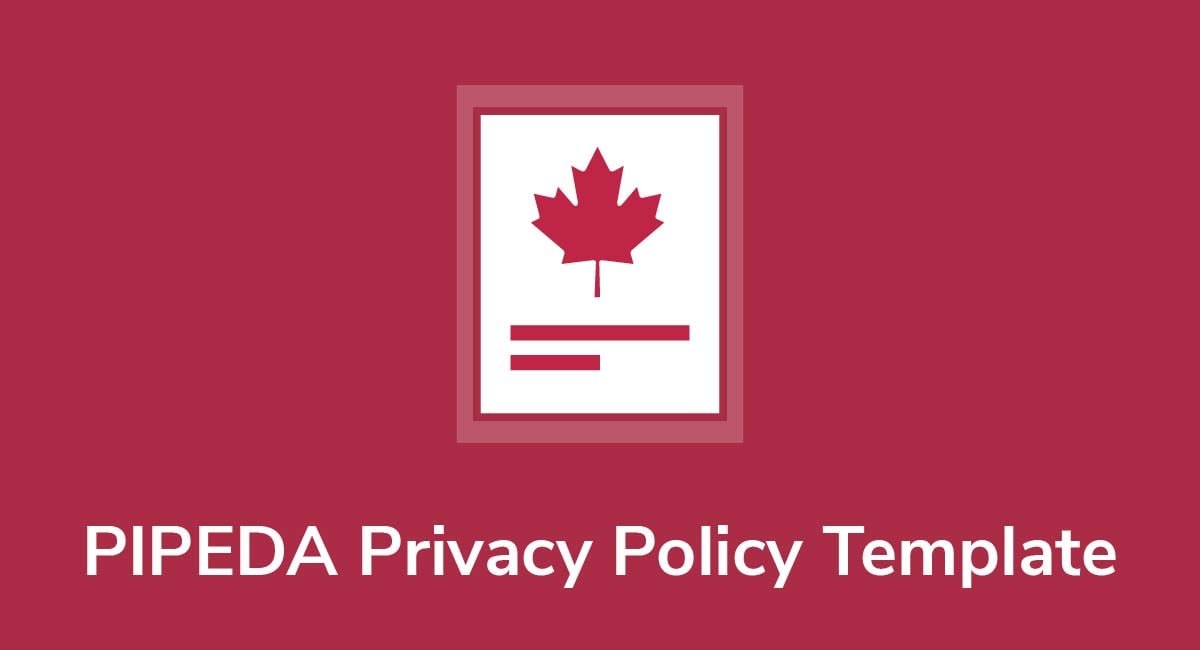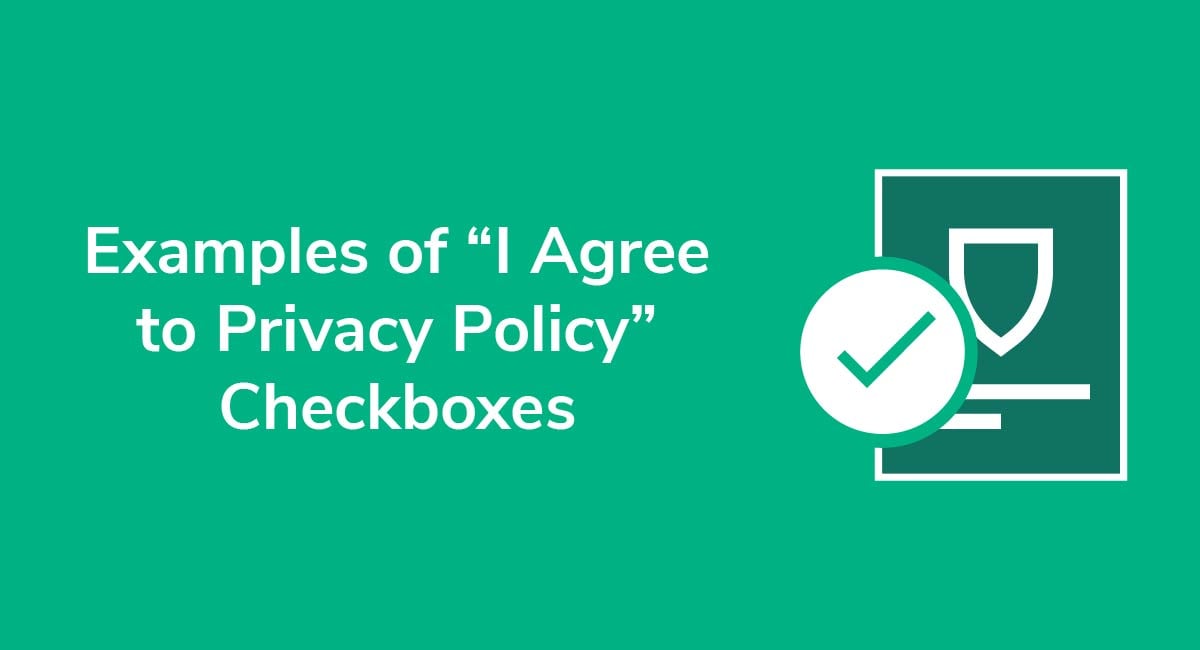Legal Agreements for Affiliate Marketers
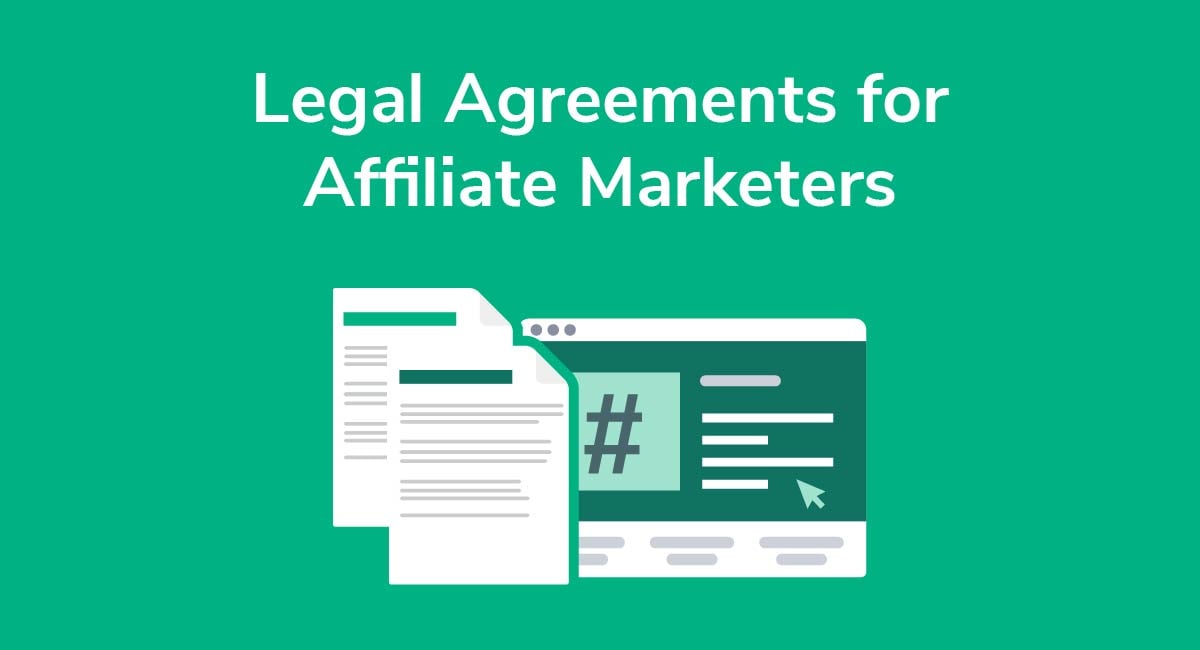
Affiliate marketing is now recognized as a form of advertising, and its regulated by the FTC. That means the wild, wild west of affiliate programs is over and your business isn't protected unless you've put together three key legal agreements for your website that participates in affiliate marketing:
- A Disclaimer for Affiliate Marketing
- A Privacy Policy for Affiliate Marketing
- A Terms and Conditions for Affiliate Marketing
These three agreements are in some cases required for participation in these lucrative programs, but they're always good business practice. Creating transparent legal agreements helps you get customer loyalty and sets you apart from the cowboys who continue to flout the law.
We've put together a guide to the three legal agreements you'll want (and need) if you want to be an affiliate marketer.
Get compliant today with PrivacyPolicies.com
Select one of our generators to create the required legal agreements for your business:
- Our Privacy Policy Generator can help you generate a customized Privacy Policy in around three minutes, for free.
- Our Terms & Conditions Generator can help you generate a customized Terms & Conditions agreement in around three minutes, for free.
- Our EULA Generator can create a customized End-User License Agreement for your mobile or desktop app.
- Our Cookies Policy Generator can create a customized Cookies Policy to help your compliance with ePrivacy Directive and GDPR.
- Our Disclaimer Generator can create a disclaimer or disclosure for your website.
- Our Return & Refund Policy Generator can help your ecommerce store by creating a returns or refunds policy.
Integrate a free Cookies Notice and Cookie Consent banner to comply with the EU ePrivacy Directive and the new GDPR law regarding cookies.
- 1. Disclaimers for Affiliate Marketing
- 1.1. Affiliate Disclaimer Examples
- 1.2. Fast Read: 3 Key Takeaways for Affiliate Disclaimers
- 2. A Privacy Policy for Affiliate Marketing
- 2.1. Examples of Privacy Policies
- 2.2. Terms and Conditions for Affiliate Marketing
- 2.3. Examples of Terms and Conditions
- 3. Conclusion
Disclaimers for Affiliate Marketing

An affiliate marketing disclaimer discloses your use of affiliate links to your customers and to the FTC. It's a simple statement saying that you make money when a visitor clicks or makes a purchase from a link shared on your website.
You need an affiliate marketing disclaimer for three reasons:
- Programs like Amazon Associates require it
- The FTC demands it
- It's good business practice
It doesn't matter if your website makes $0.00 or $100k. If you share affiliate links, you need an affiliate disclaimer.
Remaining compliant with the FTC means creating a disclaimer that follows the three C's:
- Clear
- Conspicuous
- Close to the link
Clear
The language of the disclaimer can't be ambiguous. You can't say you "might" make money. Nor should you say you "sometimes" use affiliate links. Use words that trigger the consumer to associate you with money, like "commission" and "compensation."
Conspicuous
Place the disclaimer in an obvious spot. Don't hide it in the sidebar or a jumble of graphics. Don't wedge it between the author bio and the comments section.
Even if you create a single page for the legal terms, add the disclaimer to every post including and especially the posts that contain affiliate links.
Close
Want to be totally transparent? Add the affiliate disclaimer close to the links themselves as a reminder to people clicking them that you'll be compensated for the clicks or purchases.
Affiliate Disclaimer Examples

Danielle Walker's Against All Grain is a food blog full of the author's original recipes and lifestyle tips. Although Danielle sells her own cookbooks, she also participates in affiliate programs by linking directly to the products she uses at home or products she's marketing as part of a brand partnership.
Here's her disclaimer:

Against All Grain's disclaimer is placed at the bottom of her home page underneath a list of logos of companies she has been featured by. Although it's at the bottom of the page, the lgoo list of recognizable media outlets draws the reader's eye, so the disclaimer is considered conspicuous enough.
The Points Guy is a travel hacking blog dedicated to all things travel points. The team reviews airlines, hotels and credit cards to help even infrequent travels make the most of loyalty programs and earn freebies.
Reviewing and marketing credit cards is a tricky business and The Points Guy has to be careful in the way it portrays credit products, particularly because he can earn a hefty commission for referring people to certain cards.
Its affiliate disclaimer is also located at the bottom of the home page:

You can see how careful the site is because it refers customers with any concerns directly to the site's Advertising Policy page.
The disclaimer is also found on blog posts that include affiliate links.

There are three things to note:
- The language is clear
- The disclaimer is conspicuous
- The disclaimer is placed directly above the affiliate link
Fast Read: 3 Key Takeaways for Affiliate Disclaimers
To recap, there are three main things you need to know about disclaimers:
- You need an affiliate disclaimer BEFORE you make your first dollar
- Your disclaimer should be clear, conspicuous, and close to the affiliate links
- Your disclaimer will build trust with customers
A Privacy Policy for Affiliate Marketing

Your Privacy Policy isn't necessarily related to affiliate links but rather to your use of advertising tools like Google AdSense and AdWords, which collect data.
In fact, Google AdSense Terms & Conditions requires participating websites to have a Privacy Policy because it protects not only your website but the integrity and legality of the AdSense program (and Google's bottom line).
More importantly, your visitors have a right to know how their data is used - and you have an obligation to tell them, particularly if you're generating revenue from their patronage.
More and more customers expect to know what data you collect and how your site uses it. They don't just expect it - consumers make purchasing decisions based on privacy.
A Privacy Policy lets consumers know what you're up to with their data, which allows them to make purchasing decisions they're happy about.
As noted above, if you're an AdSense participant, you need to have a Privacy Policy:

It doesn't need to be a long, complicated document. Satisfying AdSense means you'll need to meet two minimum requirements in your Privacy Policy:
- Disclose the use of third party cookies
- Provide options for users to manage cookies
A Privacy Policy for affiliate marketing should include information about:
- What data you collect
- How the data is used
- Who the data is disclosed to
- How the data is stored and managed
It's worth noting that while you can draw inspiration from similar sites while drafting your Privacy Policy, each site's Privacy Policy will be different. Why? Because not all sites collect the same amount or types of data. Some collect only email addresses while others build up giant customer profiles that may be shared with multiple partners. Less scrupulous companies collect and then sell customer data on to other companies. You also likely don't store or manage the data the same way.
Your Privacy Policy needs to disclose your unique privacy practices.
Putting together a Privacy Policy is simple and it should be one of the first pages to launch on your website. Even if you're only making a few cents a month through affiliate marketing, failing to put up a Privacy Policy may be a breach of contract with your advertising network. You could end up getting kicked off of your preferred network before you've even started to enjoy success in affiliate marketing.
Examples of Privacy Policies
The Gear Junkies Privacy Policy includes all the standard information but has a clause dedicated specifically to its affiliate programs. This clause can't take the place of an affiliate disclaimer. However, adding a clause like this to a Privacy Policy in addition to a separate disclaimer is a great way to make sure users have multiple chances to see the information:
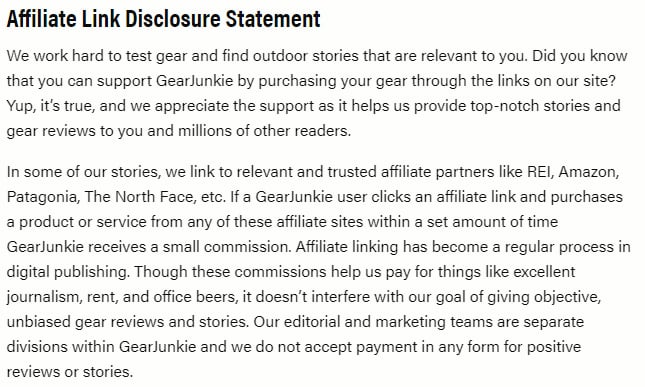
There's also a clause for advertising that mentions the use of third party cookies (such as those from Google AdWords):
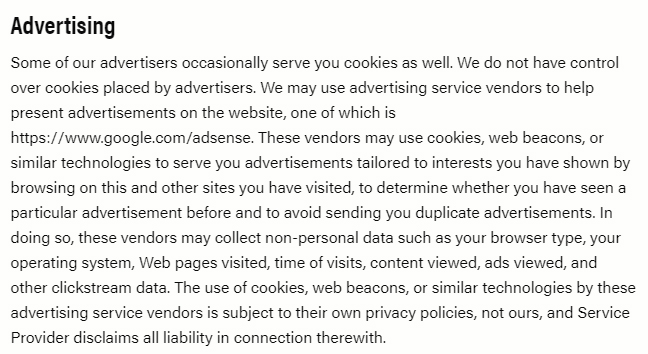
This is a great example of how you can use your Privacy Policy to help comply with affiliate marketing requirements.
Gal Meets Glam is a fashion and lifestyle blog that participates in both affiliate programs and advertising schemes.
The site contains a very general policy regarding data collection. However, the creators have added a "Links to Other Sites" section that covers both the affiliate program and any third party links it shares:

This clause is optional and could be well-used by blogs that don't collect data beyond Cookies via AdSense and other third parties.
Make sure you have a standard Privacy Policy in place that goes one step further and addresses third-party cookies and discloses affiliate practices.
Terms and Conditions for Affiliate Marketing

A Terms and Conditions page for affiliate marketing isn't legally required, but it's very highly recommended. That's because it's an essential part of any website that generates content.
It doesn't matter whether you generate the content or whether you host user-generated content or members-only content. Your Terms and Conditions agreement will outline your relationship to your users and your users' relationship to the content on your site.
If you don't have Terms and Conditions, you put yourself and your site at risk of misunderstandings and create uncertainty between yourself and your customers. Creating a Terms and Conditions is as much about holding your business accountable as it is about informing your customers.
What you include in your Terms and Conditions is determined by the kind of site you run, the kind of content you post, and what affiliate marketing programs you participate in.
At the very least, your T&C should:
- Define your service
- Outline any guarantees
- List prohibited conduct
- Set forth the terms of the agreement
- Claim your intellectual property and copyrights for yourself
Don't forget to make sure your Terms and Conditions are user-friendly. Customers can't abide by the terms if they don't understand them, so skip the legalese.
Here's a quick example of how you can customize your T&Cs for your unique brand:
Examples of Terms and Conditions
If you accept content from users in any format from articles to message boards, you'll want to outline the relationship in your Terms and Conditions.
The Penny Hoarder does a good job of this. While most of the content created for the site is created by paid staff, the site does accept user contributions when working with promotions, contests or sweepstakes, which often come up in affiliate marketing.
To govern this, The Penny Hoarder added this User Contributions clause to its Terms of Use:

The Penny Hoarder's User Contributions clause allows the site to use user contributions as it sees fit while also ensuring they remain the property of the users. It also says the contributions must comply with the Content Standards set out in another part of the Terms of Use.
Finally, the site also includes a brief section on third-party links and advertisers:

Here the Terms and Conditions state that just because a link is provided on The Penny Hoarder doesn't mean it represents The Penny Hoarder. This applies both to content and to advertising that appears on the site. This section also ties together the Terms and Conditions with its Privacy Policy to ensure all bases are covered.
Conclusion
Running an affiliate marketing business means you need to comply with marketing standards set out by the FTC. More and more affiliate programs also demand FTC compliance in their own Terms of Use because your compliance reflects their own - and no one wants to get fined or even shut down for violated marketing standards.
Keep your affiliate marketing tactics in line with the law by adding a disclaimer, Privacy Policy, and Terms and Conditions to your website.
- Your Disclaimer lets customers know you'll make money based on their purchases.
- Your Privacy Policy tells them what happens to the data they hand over on your site.
- Your Terms and Conditions establishes the relationship between you and your customers by outlining each of your responsibilities.
Not only will you ensure you remain on the right side of the FTC's watch dogs, but your honesty and transparency will earn you points with customers. At the end of the day, you'll set yourself apart from the cowboys and develop a stronger relationship with customers, which is what running a business is all about.

